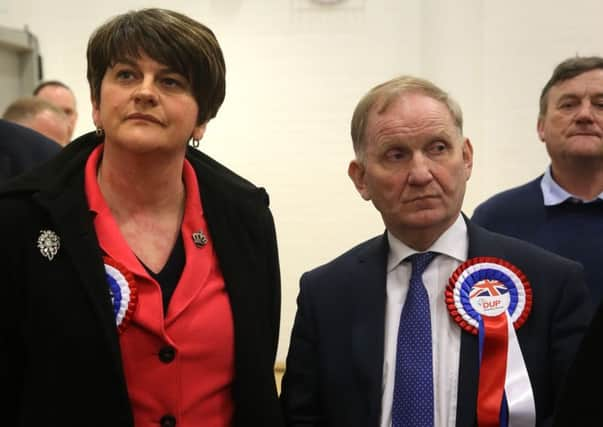Sam McBride: A catastrophe for unionism; a triumph for renewed nationalism


In the short term at least, Sinn Fein’s decision to call the snap poll has been handsomely vindicated – although if it results in a return to Tory direct rule, that decision might look strategically less clear-cut in the time ahead.
The centre ground parties – Alliance and the Greens – have had a strong election, proportionately increasing their representation in the Assembly.
Advertisement
Hide AdAdvertisement
Hide AdBut for unionism, this election has been nothing short of disastrous. For unionism to lose its majority at Stormont is a seismic moment in Northern Ireland’s political history. As the Province heads towards its centenary in 2021, the Stormont chamber is reflective of the new Northern Ireland and it is a situation which Carson and Craig would struggle to comprehend.
In this election, both main unionist leaders’ strategies failed unionism, even if in Arlene Foster’s case it helped to save the DUP from a much worse result.
Ulster Unionist leader Mike Nesbitt’s positioning of the UUP as much closer to the SDLP, with which he has been working in opposition at Stormont, did not pay off.
His comment that he would personally give his second preference vote to the SDLP candidate rather than to other unionists ran contrary to a century of unionism’s “united we stand, divided we fall” ideological certitude.
Advertisement
Hide AdAdvertisement
Hide AdAlthough his proposal appealed to some voters who wanted to see a new era of opposition versus government politics, the comment fundamentally unnerved and bewildered far more unionist voters than it won over.
While the UUP’s share of the vote was actually fractionally up (by 0.3%), the party lost some key MLAs, among them veteran former deputy leader Danny Kennedy, and came in behind the SDLP for the first time in its history.
Given that the UUP was facing its larger electoral rival, the DUP, in circumstances where the DUP leader was implicated in a financial catastrophe which could cost taxpayers as much as £500 million, this was a shockingly bad result for the UUP.
Other smaller unionist parties also saw their vote fall. Of particular note, Jim Allister’s TUV finds itself again largely rejected at the polls. The TUV total of 20,523 votes across Northern Ireland is derisory, even if leader Jim Allister is one of the stars of the Assembly chamber. To put that result in context, the late Ian Paisley in his pomp took more than 25,000 votes in North Antrim alone in his last general election.
Advertisement
Hide AdAdvertisement
Hide AdFor the DUP, the election result could have been even worse if it had lost its status as Stormont’s largest party.
But leader Arlene Foster has lost the confident charm which saw the party romp home to a 10-seat advantage over Sinn Fein just 10 months ago.
In the next Assembly the parties are now neck-and-neck. For republicans, this was an outstanding electoral result.
A year ago, Sinn Fein had the biggest percentage point drop (-2.9%) of any party; it was followed by the SDLP (-2.2%).
Advertisement
Hide AdAdvertisement
Hide AdThis election saw the SDLP’s share of the vote virtually unchanged. But Sinn Fein stormed ahead, increasing its vote share by almost 4%.
In part, that was an endorsement by nationalists of Martin McGuinness’s final political decision before he retired – to collapse Stormont, finally getting tough with a DUP which republican grassroots saw as swaggeringly arrogant.
But it was also a consequence of the DUP leader’s decision to make this a very tribal campaign. The DUP’s entire campaign was based around the mantra of keeping out Sinn Fein, rather than standing on its record.
That probably helped save the DUP from the full fury of an electorate angered at months of scandal. But in so doing, Mrs Foster reinvigorated a sleeping nationalism and drove more moderate unionists to the cross-community Alliance Party. One veteran SDLP figure said that immediately after Mrs Foster’s “crocodile” jibe they instantly noticed a hardening of nationalist attitudes while canvassing, with voters going towards Sinn Fein.
Advertisement
Hide AdAdvertisement
Hide AdTen months’ ago, Arlene Foster took the plaudits for a stunning DUP result.
Now, for the first time in the history of Northern Ireland, unionism will not be a majority in the Stormont chamber. As the leader of unionism, Mrs Foster is under enormous pressure to explain such a result.